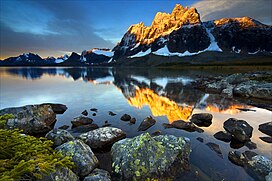Redoubt Peak
| Redoubt Peak | |
|---|---|
 Redoubt Peak seen from Amethyst Lakes at sunrise | |
| Highest point | |
| Elevation | 3,115 m (10,220 ft)[1][2] |
| Prominence | 179 m (587 ft)[3] |
| Listing | |
| Coordinates | 52°41′22″N 118°17′57″W / 52.68944°N 118.29917°W[4] |
| Geography | |
 | |
| Interactive map of Redoubt Peak | |
| Country | Canada |
| Provinces | Alberta and British Columbia |
| Protected areas | |
| Parent range | Park Ranges Canadian Rockies |
| Topo map | NTS 83D9 Amethyst Lakes[4] |
| Climbing | |
| First ascent | 1927 F. H. Slark; F. Rutishauser |
| Easiest route | North-West Ridge III 5.6 East Face IV 5.7 |
Redoubt Peak is a 3,115-metre (10,220 ft) mountain summit located on the shared border of Jasper National Park in Alberta, and Mount Robson Provincial Park in British Columbia, Canada. Redoubt Peak is part of The Ramparts in the Canadian Rockies. It was named in 1920 because it has an appearance similar to that of a redoubt on a castle.[3] Its nearest higher peak is Dungeon Peak, 0.6 km (0.37 mi) to the southeast.[3]
History
[edit]The first ascent was made in 1927 by F. H. Slark and F. Rutishauser, who both perished on the descent.[3] The following summer (1928), Douglas Busk and J.E. Johnson made the second ascent with Hans Fuhrer. On a ledge Fuhrer found "Slark’s rucksack with a pair of mountain boots in addition to the rest of the stuff; these were small boots, and from his size Slark must have had big feet, so I think it probable that Rutis was climbing in stockinged feet on the cliffs directly below the summit when they fell. It was a place we looked at in horror, and circumnavigated. I am firmly convinced that they fell and were not struck by falling stones", on the summit they found a tin containing the names of the missing climbers.[5][6] The 1928 party inferred that Slark and Rutishauser ascended the W. ridge and were trying to descend the S. face when the accident occurred.[7]
The mountain's name became official in 1935 by the Geographical Names Board of Canada.[4]
Climate
[edit]Based on the Köppen climate classification, Redoubt Peak is located in a subarctic climate zone with cold, snowy winters, and mild summers.[8] Temperatures can drop below -20 °C with wind chill factors below -30 °C. Precipitation runoff from Redoubt Peak drains into the Athabasca River on its east side, and the Fraser River from the west side.
Gallery
[edit]

See also
[edit]References
[edit]- ^ "Redoubt Peak". cdnrockiesdatabases.ca. Retrieved 2021-10-24.
- ^ "Topographic map of Redoubt Peak". opentopomap.org. Retrieved 2021-10-24.
- ^ a b c d "Redoubt Peak". Bivouac.com. Retrieved 2018-10-18.
- ^ a b c "Redoubt Peak". Geographical Names Data Base. Natural Resources Canada. Retrieved 2018-10-18.
- ^ Johnson, J. E. (1928). "Ascents of Mts. Redoubt and Casemate" (PDF). Canadian Alpine Journal. #17: 58–60. ISSN 0068-8207. Retrieved 8 October 2024.
- ^ Busk, Douglas (1946). The Delectable Mountains. Hodder & Stoughton. p. 163.
- ^ Busk, D. L. (1928). "New Expeditions : (c) the Rampart Group" (PDF). Alpine Journal. #40 (237): 384–385. ISSN 0065-6569. Retrieved 8 October 2024.
- ^ Peel, M. C.; Finlayson, B. L.; McMahon, T. A. (2007). "Updated world map of the Köppen−Geiger climate classification". Hydrol. Earth Syst. Sci. 11: 1633–1644. ISSN 1027-5606.
External links
[edit]- "Redoubt Peak". BC Geographical Names.
- Parks Canada web site: Jasper National Park
- Provincial Park web site: Mount Robson Provincial Park


